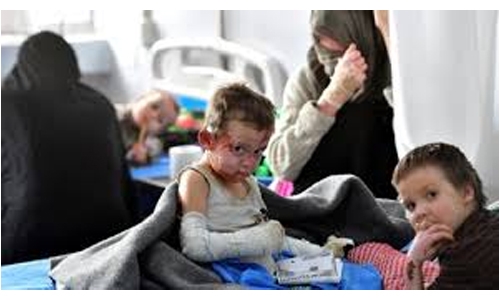IS exodus overwhelms Syria hospitals
Young children nursing severe facial burns, others suffering from malnutrition -- an exodus of jihadist families and civilians from the Islamic State group’s vanquished final enclave is overwhelming eastern Syria’s hospitals. A handful of health facilities in the Kurdish-administered northeast receive dozens of patients every day, often including young victims who are terribly disfigured, some allegedly by mortar fire. Most arrivals are women and children from Al-Hol, a camp for the displaced that has swelled far beyond its capacity to house more than 70,000 people during a months-long offensive against the last scrap of the jihadists’ “caliphate”.
“The situation here in the hospital is tragic,” said Aydin Sleiman Khalil, who manages the main health institution in Hasakeh, some 40 kilometres (25 miles) from Al-Hol. To cope with the influx, the semi-autonomous Kurdish region’s hospitals are desperately seeking support from the international community and aid agencies. “We lack equipment, medicine, finances and medical personnel,” Khalil said, urging humanitarian groups and the United Nations to help.
Lit by neon strips, long and clean corridors led to a succession of hushed rooms inhabited by women clad in black from head-to-toe, caring for their sick and wounded offspring. In one room, several women slept on iron beds, their newborn babies in nearby cots, wrapped in thick blankets. On another floor, Iraqi mother Badreya Kamel said she arrived a few days ago with her three children. One of them, Rowayda, died at the hospital on Monday from severe burns. “She was two years old,” said the 24-year-old, her voice barely audible behind her face veil, long black robes draped over her frail figure.
‘Urgent need’
Kamel had spent the last five months at Al-Hol, after fleeing a village caught up in the fighting between IS and the Syrian Democratic Forces (SDF), who are backed by a US-led coalition. She left her tent to look for breakfast one recent morning. During her brief absence, her children lit a gas stove, sparking a fire. Four-year-old Zobeida and 10-year-old Hafsa survived. In their hospital room, both children sat in silence, moving their heads only rarely, a thick cream smeared over the raw, red wounds disfiguring their faces.
“We do what we can, but it’s not enough,” said Khalil, referring to the two girls and a clutch of other very young burn patients. “They need more care -- more medicine, aesthetic surgery.” His hospital hosts around 25 in-patients who fled the collapsing IS “caliphate”, mainly via Al-Hol. Around 50 more arrive for out-patient appointments each day from the camp, including many who need dressings changed and wounds cleaned.
In March alone, local hospitals were “overwhelmed” by some 2,000 women and children from Al-Hol, mostly suffering from wounds or malnutrition, the International Rescue Committee (IRC) aid group says. But two new field hospitals should open at the camp itself by the end of April, the aid group says, to fill what the United Nations says is a pressing need.
“There is an urgent need for expanded health services in the camp itself,” said the UN’s Office for the Coordination of Humanitarian Affairs, or OCHA. Donors have disbursed 4.3 million dollars (3.8 million euros) for Al-Hol, including to combat malnutrition and to provide emergency health care, it said.
‘Many children burnt’
On March 23, the SDF proclaimed victory against IS, after dislodging the jihadists from all but a few tunnels on the edge of Baghouz, a village that served as their final Syrian redoubt. Over several weeks before that, the Kurdish-Arab alliance periodically had paused operations to allow out civilians -- including jihadists’ families -- and surrendering fighters. Among the 500 most recent arrivals to Al-Hol, a number of women and children were trucked in with burns and shrapnel wounds, the IRC confirmed. Saniya Roustom arrived around three weeks ago at the hospital, where she shares a room with two other Russian women and their children, all burn cases.
The 32-year-old had been trapped in Baghouz, where she sheltered against the gun battles, mortar fire and coalition air strikes in a trench covered by tarpaulin sheet. That sheet was ignited by a mortar round, she said. “Many children were burnt. They needed help, good doctors... We were brought here,” Roustom said in hesitant Arabic.
Of her six children, only one is still alive. The others died during other bombardments, or from their burns. Five-year-old Mariam sat stooped on a hospital bed, her blonde hair trimmed short, parts of her face terribly burnt. Her skinny forearm swaddled in bandages, she clutched a pen and scribbled on a notepad.
Related Posts

